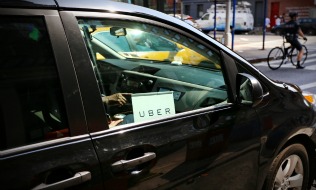

Drivers who work for Uber Technologies Inc. in Ontario have launched a class action lawsuit arguing the company has misclassified them as independent contractors and should instead treat them as employees.
According to the statement of claim, the plaintiffs are asking for $200 million in damages, plus $2,000 for legal fees. They’re also asking for reimbursement for any Canada Pension Plan and employment insurance contributions they’ve made as independent contractors that Uber should have made as their employer. None of the allegations have been proven in court.
Read: California Uber drivers turn to Teamsters in push for benefits
The lawsuit followed Uber’s move to “unilaterally” change the terms for its Uber Eats drivers, lowering their compensation by 40 to 60 per cent, says Stephen Gillman, a lawyer at Samfiru Tumarkin LLP in Toronto who’s representing the drivers. “The drivers were forced to agree to a contract, in some cases in the middle of an order, that lowered their compensation.”
The class action, which represents all Uber drivers who work or have worked in Ontario since 2012, alleges “the duties performed by the class members and the supervision and control imposed on the class members by Uber creates an employment relationship with Uber.” It notes Uber provides training, screens drivers, ensures their vehicles meet specific requirements, suspends those whose vehicles aren’t up to par, sets prices and compensation and handles any complaints about drivers, among other employer responsibilities.
Read: Which broker provides health benefits for Etsy and Uber staff?
Because Uber has so much control over working conditions, drivers should be considered employees not independent contractors, the statement of claim argues. As such, the plaintiffs allege Uber must abide by Ontario’s Employment Standards Act by paying the minimum wage and providing overtime, vacation and public holiday pay; advise drivers of their entitlement to those payments; and accurately track their hours.
“In order to receive a livable wage, [chief plaintiff David] Heller was required to work 40-50 hours per week without receiving the minimum wage, contrary to his contractual terms,” the statement of claim alleges. It also points out drivers are “low-skilled employees under the direct control and supervision of the defendants” who rely on Uber to inform them of their employee status and pay eligibility.
Read: Why you should hire a chief freelance officer
In October 2016, the Central London Employment Tribunal in England ruled Uber drivers are employees, not independent contractors.
“Drivers will have holiday pay, statutory sick pay and should be paid the minimum amount for what their hours are if they’re not achieving the incomes that are acceptable under the mandate of the law,” Steve Garelick, branch secretary of professional drivers at the GMB union in London, told Benefits Canada in November.
Similar lawsuits have emerged throughout the United States with varying results, Gillman notes. ”We’re confident [Canada’s] laws will support our position,” he says.
